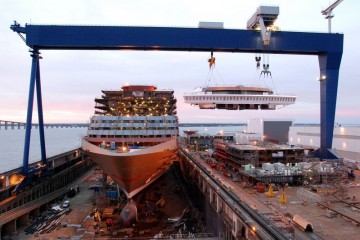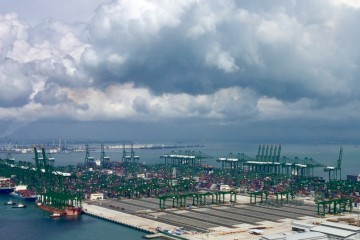Global trade is contracting, for cyclical and structural economic reasons. Cyclical, as most of the developed economies have not completely recovered from the 2008/9 crisis. Structural, as the limits of the global outsourcing model have been reached, mainly because the Chinese economic model has shifted from export-led growth towards production for domestic consumption. As a result the trade/GDP multiplier has declined recently from around 2.5 to less than one: one percentage point of GDP growth will result in less than one percentage point of trade growth. Not good news for shipping companies or ports. But things are likely to get worse.
This time it is not economics that will mess up global trade, but politics. The Brexit vote is an example in case of the wide-ranging impact of mediocre political leadership and the potentially disastrous impact it can have on global trade. This is just the beginning. Fast-forward one year to August 2017: US President Trump is building his promised wall on the border with Mexico and signing papers to withdraw from WTO, whilst the new French president Marine Le Pen is preparing for the exit of France from the EU. Considered highly unlikely one year ago, yet more and more possible every day. At the core of it: popular discontent with globalisation.
Now, this sentiment is certainly justified: the globalised economy has downsides that current politicians have been unable to address in a meaningful way. The core problem is that globalisation tends to exchange with us in our capacity as consumer – reflected in lower prices for consumer goods, but it ignores that we are much more than a consumer: for example, we are also taxpayers, workers, residents and community members. Shipping provides the perfect example in case. As consumers we might be happy with shipping and the lower prices for consumer goods that it brings, but as taxpayers we might be concerned about large state aid measures without clear benefits, as workers we are concerned with automation, job losses and the 24/7 flexibility that shipping requires, as urban resident we might be annoyed by congestion caused by port traffic and by air pollution from ships; as responsible citizen possibly appalled by the working conditions of certain seafarers and ship scrapping yards. Shipping has made globalisation possible, by lowering trade costs and prices for consumers. At the same time, it has facilitated global outsourcing, adheres often to lowest common denominator norms, offloads external costs to other parties and soaks up public money.
Yet, even if global trade is unjust, no trade will probably lead to worse outcomes. So, what is urgently needed is political solutions to square globalisation with daily concerns of citizens. This is also the case for shipping. More than ever, there is a need for shipping companies that take their wider social responsibilities seriously.
The postwar consensus has always been that trade between nations will make them more interdependent, so less inclined to go to war with each other. There is a real possibility that some of the world’s largest economies will soon be ruled by leaders that not only question the value of trade but also ignore how trading between nations has provided geopolitical stability.
1 Comments
Comments are closed.




Dear Olaf,
I permit to suggest you to consider the global trade both in term of value and in term of weight and to calculate 2 different multipliers.
We could work together on this topic, if you agree.
BR,
Luca